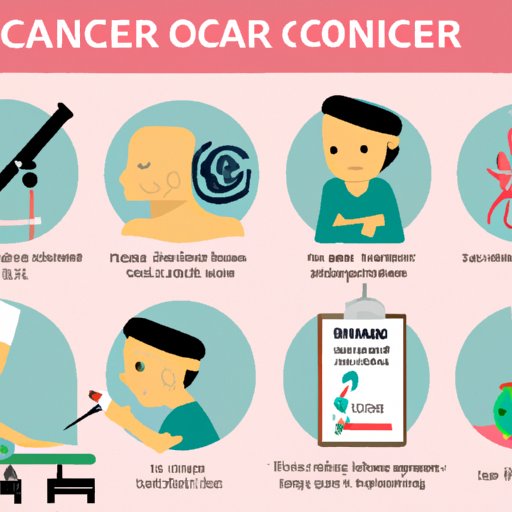
Introduction
The word “cancer” can strike fear in even the toughest of us. While it’s a common disease, it is not a death sentence. Detecting cancer early can increase the chances of successful treatment and a cure. Unfortunately, cancer can be a silent enemy, with no obvious symptoms in its early stages. This article will explore the nature of undetected cancer cells, how long cancer can go unnoticed, and the importance of routine check-ups and cancer screenings.
The Silent Enemy: Could You Have Cancer Without Knowing?
Cancer cells are abnormal cells that grow uncontrollably. Unlike healthy cells, cancer cells do not die, and they can invade and damage surrounding tissues. These cells can grow and spread for months or even years before producing noticeable symptoms. Therefore, many people may have cancer without even knowing it.
According to The American Cancer Society (ACS), around 1 in 3 people in the United States will develop some form of cancer in their lifetime. Most types of cancer have no obvious symptoms in their early stages. In many cases, the disease is only detected after it has reached an advanced stage.
Unnoticed and Unseen: How Long Can You Have Cancer Without Knowing?
Several factors can affect how long cancer can go unnoticed. These factors include the type of cancer, the location of the cancer, and a person’s overall health. For example, colon cancer can develop over several years before producing symptoms, such as rectal bleeding, pain, or changes in bowel habits. Similarly, lung cancer can go undetected for years, causing symptoms only when the disease is advanced.
The ACS states that the duration of time cancer may go undetected varies from person to person. In some cases, people with cancer may experience symptoms right away. In other cases, it may take months or years for the disease to produce symptoms.
The Importance of Regular Check-Ups: Detecting Cancer Before It’s Too Late
Routine check-ups and cancer screenings are essential for detecting cancer early. Many types of cancer, such as colon and breast cancer, can be detected at early stages using routine screenings. Detecting these cancers early can increase the chances of successful treatment.
The ACS recommends that people should get screened for colorectal cancer starting at age 45. Women should get mammograms starting at age 45 and should continue to get them every 1 to 2 years. Pap tests and HPV tests are also recommended for women to detect cervical cancer. Similarly, people who smoke or have a history of smoking should get screened for lung cancer with a low-dose CT scan.
Are You at Risk? Understanding Suspicion and Detection of Cancer
Several risk factors make a person more likely to develop cancer. Common risk factors include age, family history, lifestyle factors such as smoking and poor diet, and exposure to certain toxins. It’s essential to understand the signs and symptoms of cancer and to discuss any concerns with a healthcare provider.
Symptoms such as persistent cough, blood in urine or stools, abnormal lumps, and unexplained weight loss could indicate cancer. However, these symptoms can also indicate other less severe conditions. Therefore, it’s critical to talk to a healthcare provider if you are concerned about your symptoms.
The Long Wait: Often, Cancer is Caught Too Late.
The longer cancer goes undetected, the more advanced it may become. Advanced cancer can be more challenging to treat and may require longer, more intense treatments. Additionally, advanced cancer can have a more profound impact on a person’s physical, emotional, and financial well-being. Therefore, it’s crucial to seek help if you have any concerns about your health.
The American Cancer Society can help people understand cancer better and provide support and resources to people battling the disease. They can also help connect people to support groups and counseling services if needed.
Conclusion
Many types of cancer can go unnoticed for months or even years, making early detection critical to successful treatment. Routine check-ups and cancer screenings can detect cancer at an early stage, increasing the chances of successful treatment and recovery. Understanding the risk factors for cancer and discussing any concerns with a healthcare provider is essential. Cancer can be a challenging disease, but it doesn’t have to be a death sentence. With the right care and support, people can overcome cancer and live healthy, fulfilling lives.
Remember to prioritize your health and get regular check-ups and cancer screenings. By catching cancer early, you’re giving yourself the best chance of successful treatment.





